AMD’s Ryzen Threadripper 7000 CPUs offer up to 96 and 64 cores in the PRO and HEDT variants, respectively. We’ll be covering the latter (HEDT) here. The TR 7980X was reviewed a few days ago, and here we’ll be checking the 7970X out. The Ryzen Threadripper 7970X features 32 Zen 4 cores with a peak single-core boost clock of 5.3GHz, higher than the 5.1GHz in the 7980X. They are paired with a massive 128MB L3 cache pool, divided into smaller chunks of 32MB each. It offers 48 PCIe Gen 5, 32 PCIe Gen 4, and 8 PCIe Gen 3 lanes, down from 128 Gen 5 lanes on the PRO platform.

The Ryzen Threadripper 7000 chips leverage the sTR5 socket with quad-channel DDR5 RDIMM 5200 support and a TDP of 350W. Up to twelve 5nm CCDs are paired with a 6nm I/O die using the Infinity Fabric interconnect.
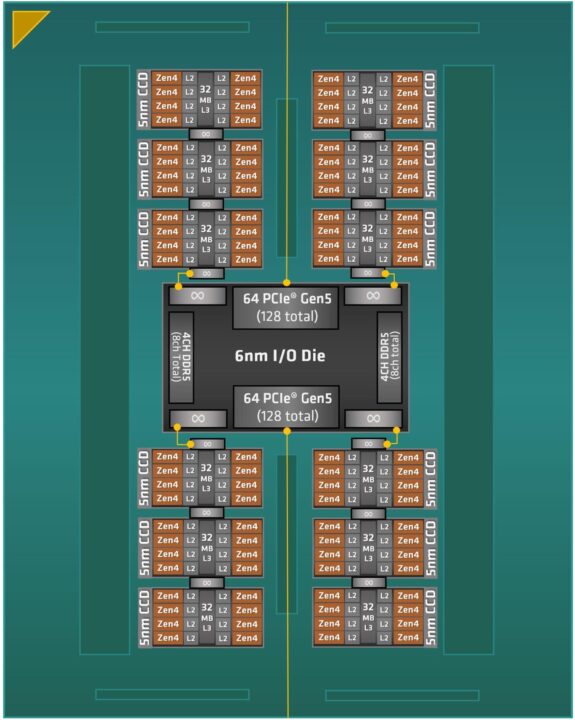
Test Bench
- Motherboard: ASUS PRO WS TRX50 Sage.
- GPU: NVIDIA GeForce RTX 4090 FE.
- Memory: G.Skill Zeta R5 Neo DDR5 32GB x4 @ 6,400 MT/s.
- Cooler: NZXT Kraken 360.
- Power Supply: Corsair RM1000i.
Image Processing and Video Editing
Adobe Creative Cloud is the most popular video/photo editing suite, now available as a subscription. We used the PugetBench suite to evaluate the performance of Photoshop, Lightroom Classic, Premiere Pro, After Effects, and Da Vinci Resolve.
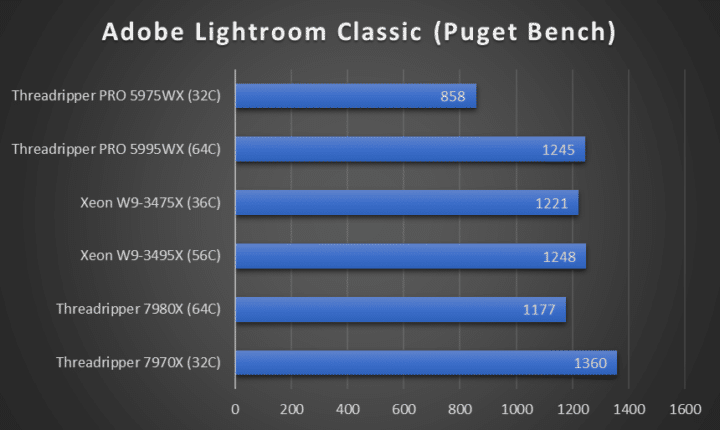
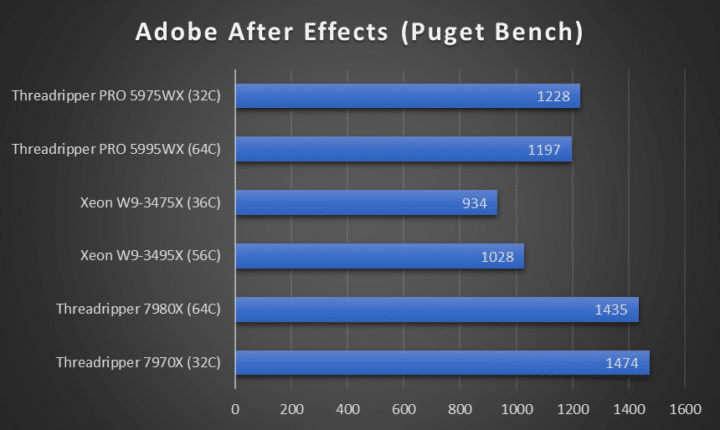
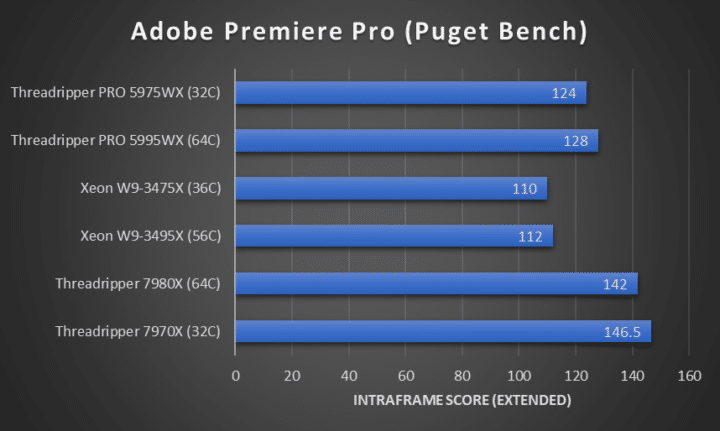
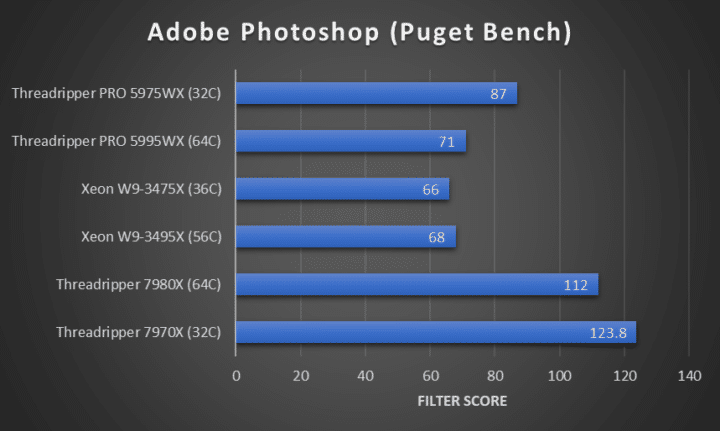
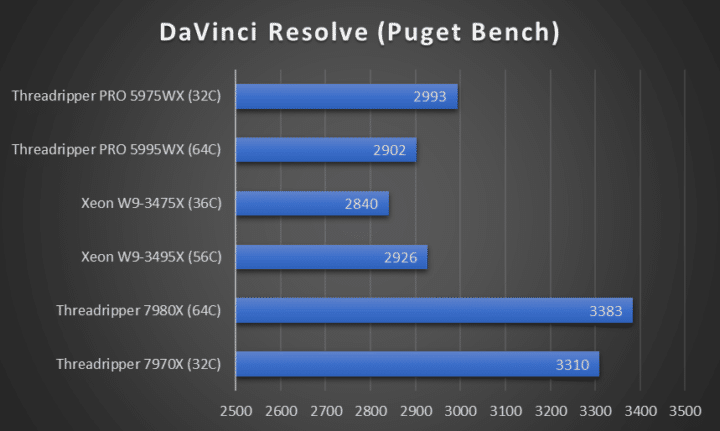
The Threadripper 7970X consistently delivers top-of-the-line performance, beating its Xeon W9 rivals and the preceding Threadripper PRO 5995WX and even the 7980X. The deltas are particularly massive in Da Vinci Resolve, where all 32 cores spring into action, ripping the competition to pieces.
Rendering Performance
Rendering tests are crucial components of any content creation test suite, the most notable among them being Cinebench and Blender. These workloads love the extra cores the Threadrippers offer, scaling extremely well on the 7970X.
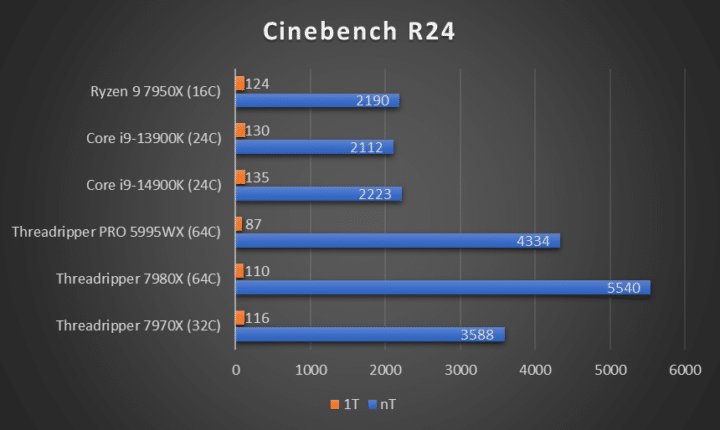
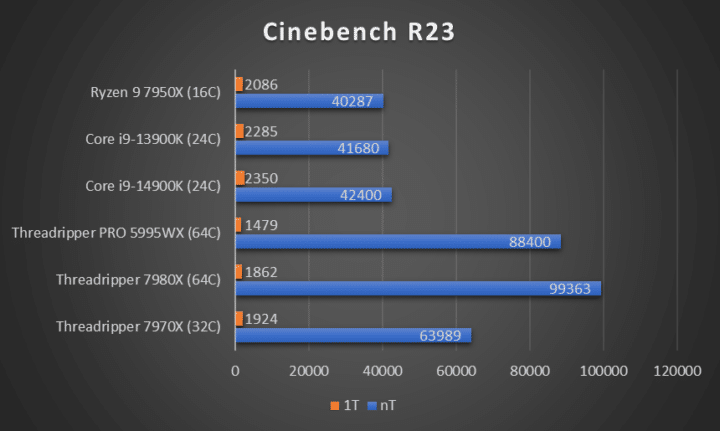
The TR 7970X is an absolute beast in these compute-oriented workloads, just like the TR 7980X. It beats the 64 core TR 7980X in single-threaded workloads but gets crushed by it in the multi-threaded workloads, understandably due to the lower core count in the 32 core TR 7970X.
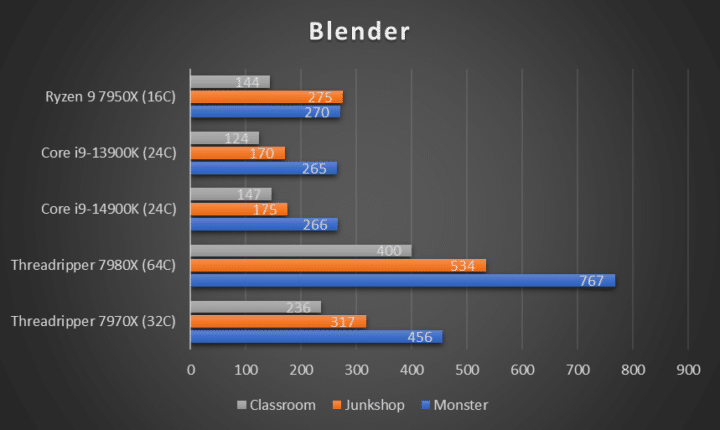
In Blender, the 7970X is nearly 1.5x faster than the Ryzen 9 7950X, indicating healthy scaling from the dual-CCD to the 12-CCD design. The companion 7980X meanwhile is nearly 2X faster than the 7970X.
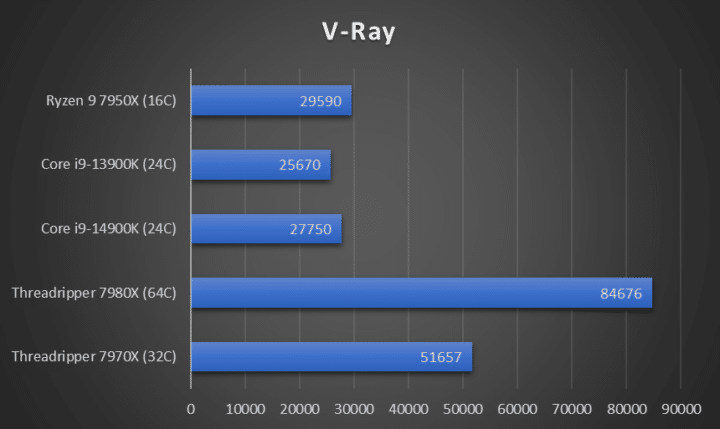
We see similar gains in V-Ray as the Threadripper 7970X leads the Core i9s and the Ryzen 9 by 93% and 75% respectively, coming short of the 7980X by almost 40%.
Continued on the next page…
File Compression and Encoding
LZMA-based file compression benefits from the additional cores on the 7970X, but video encoding hits a wall after 32 cores, relying on IPC and clocks for performance gains beyond that.
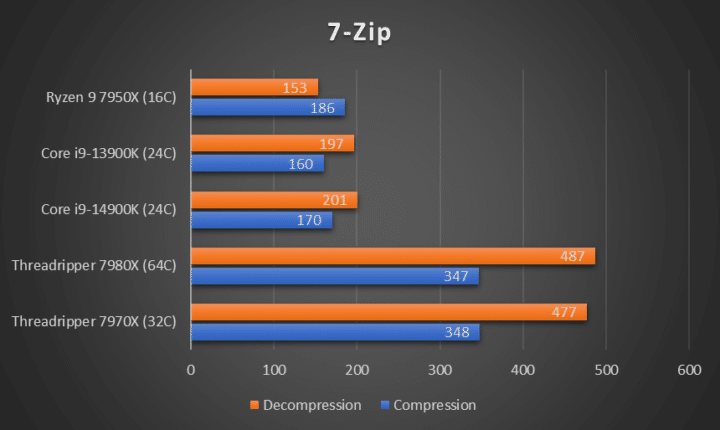
The Threadripper 7970X is up to 2x faster than the Ryzen 9 7950X in compression, increasing the lead to over 3x in decompression. Due to the aforementioned lack of scaling beyond 32 cores, it’s pretty similar to the 7980X here.
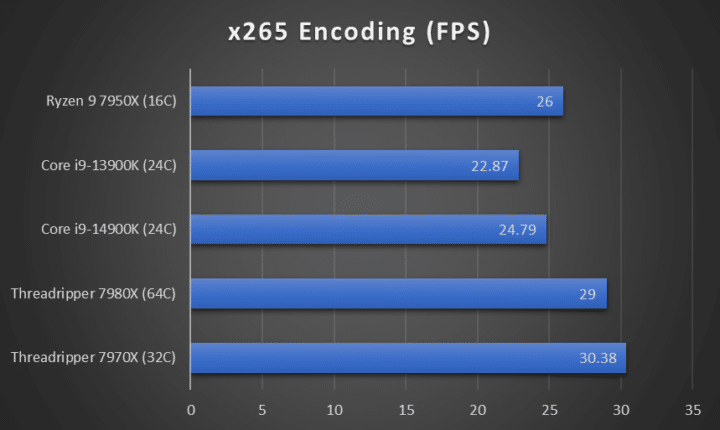
Encoding x265 video is fairly intensive on modern CPUs, depending on the instructions used. The above test leverages FMA3, AVX, and AVX2 to deliver slightly higher frame rates on the 7970X, and slightly surpassing the 7980X as well.
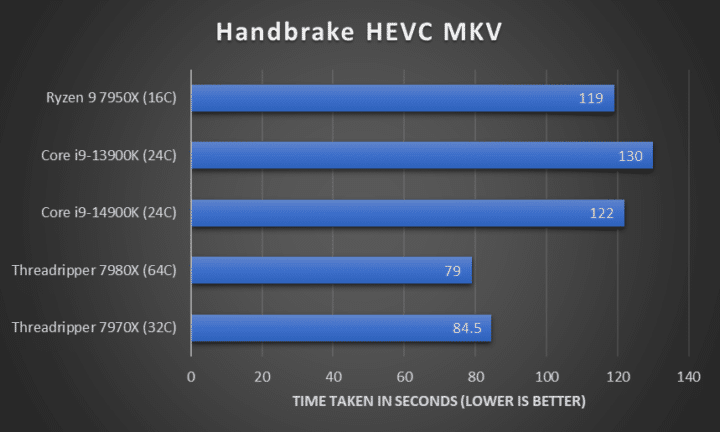
In Handbrake, using the Matroska HEVC 1080p preset, we see the Threadripper 7970X wrap up the work over 50% faster than the Core i9-14900K and the 7950X and being slightly slower than the 7980X.
SPECworkstation 3.1.0
The SPEC workstation suite is an extensive benchmark suite with CPU, GPU, and storage tests. We filtered out the CPU-intensive loads to draw the following performance charts:
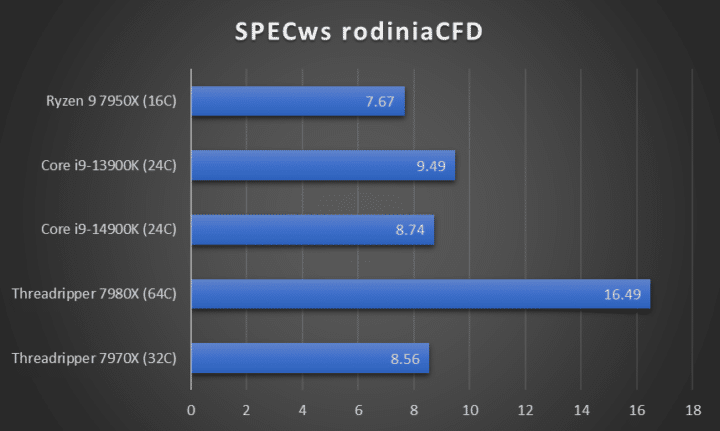
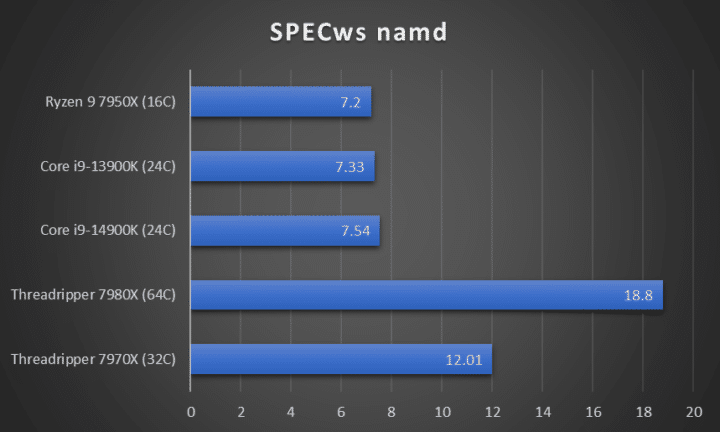
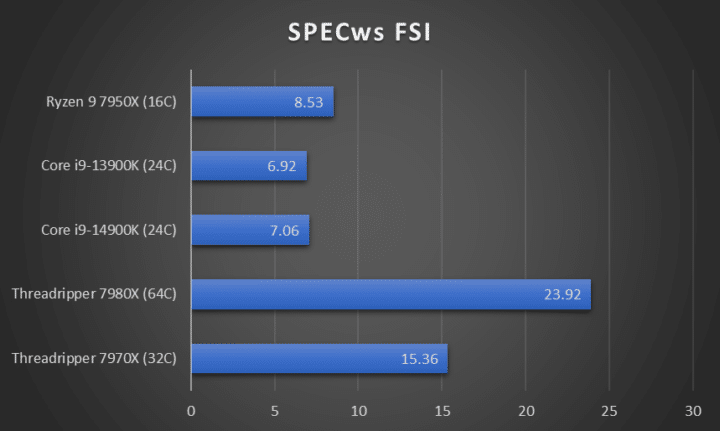
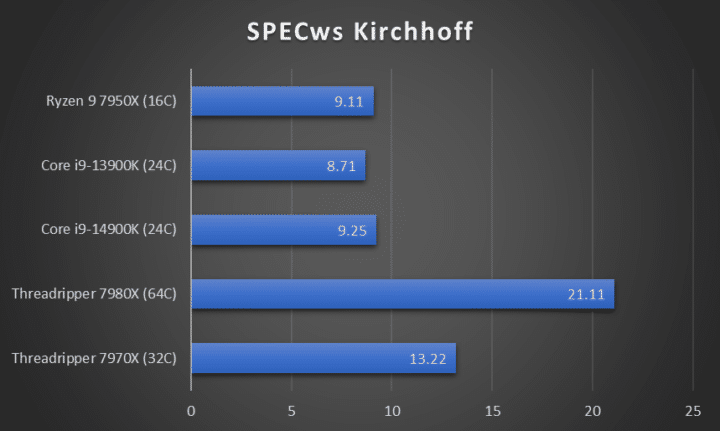
The Threadripper 7970X destroys the mainstream x86 chips in these compute-intensive tests, albeit being almost 50% slower than the 7980X.
Gaming Benchmarks
Not many people associate gaming with Threadrippers, and for good reasons. Most modern titles prefer octa-core CPUs with high clocks and low memory latency. Regardless, the 7970X delivers a respectable gaming performance.
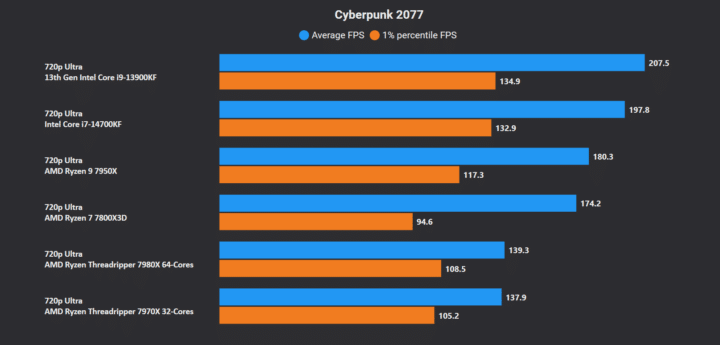
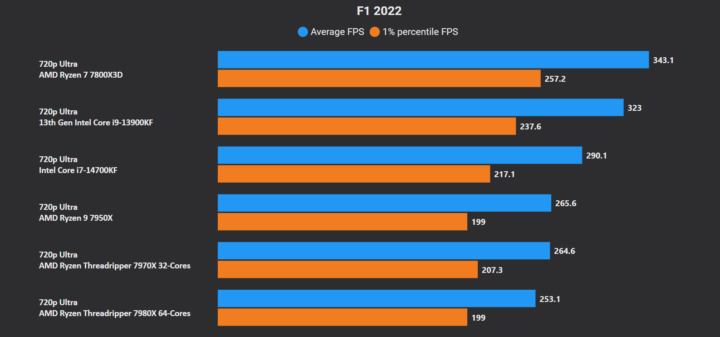
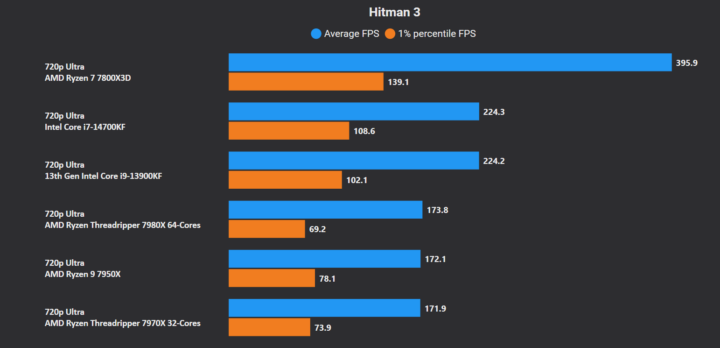
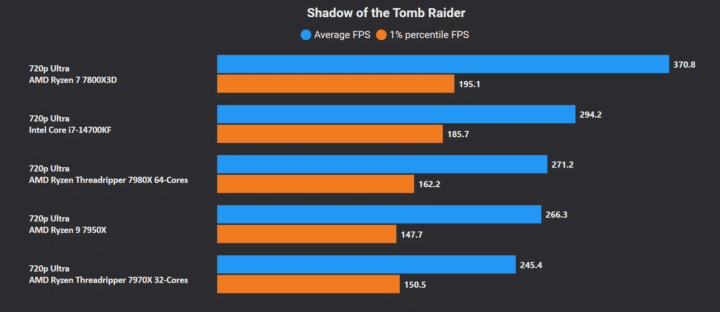
The Threadripper 7970X is roughly as fast as the Ryzen 9 7950X in most gaming workloads, but stays at the bottom of the list, unlike the 7980X which manages to surpass the 7950X in Hitman 3 and Shadow of the Tomb Raider. It manages to beat the 7980X in F1 2022 by a very slight margin, otherwise staying at roughly the same or lower frames in most titles.
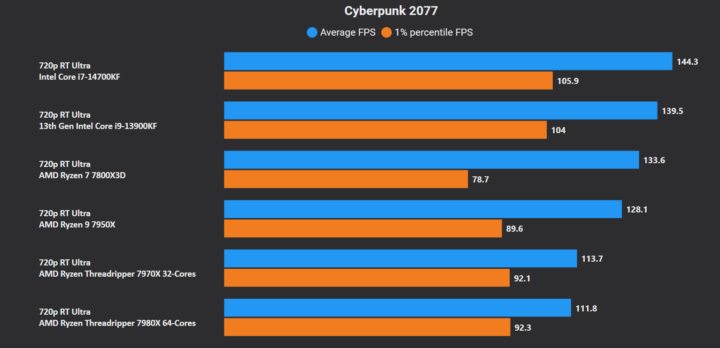
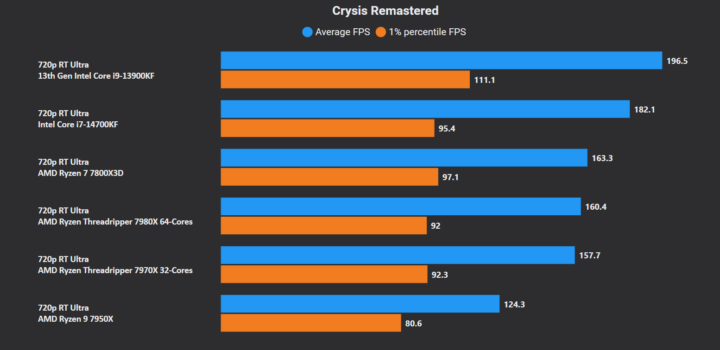
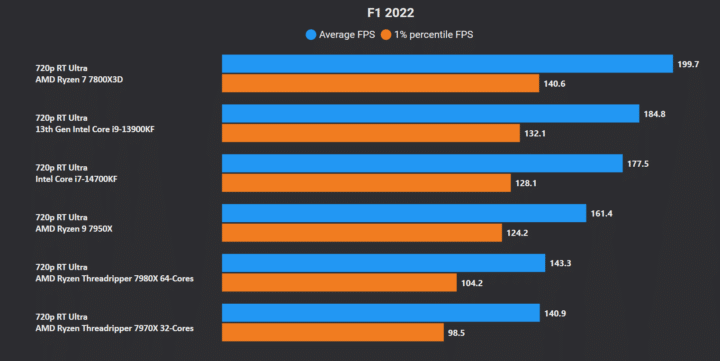
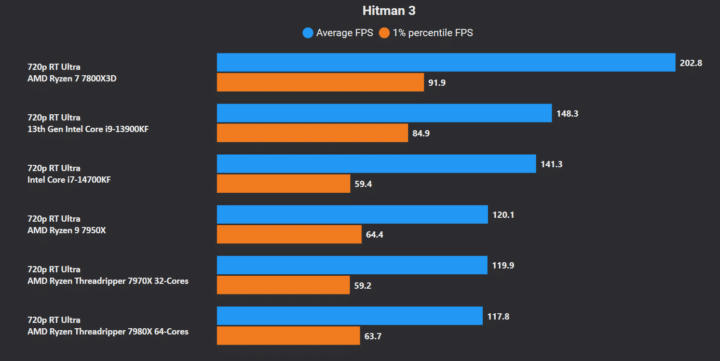
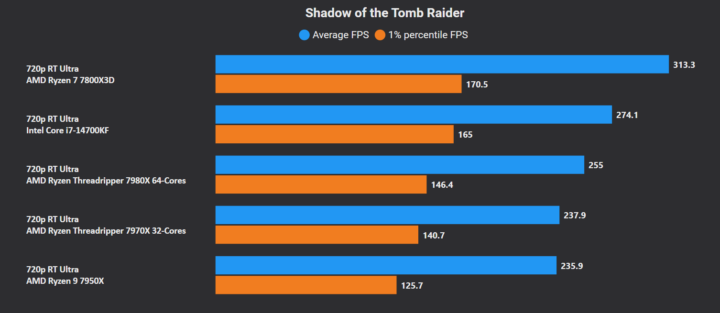
With ray tracing enabled, the 7970X delivers roughly the same performance as the 7980X, even marginally surpassing it in titles like Hitman 3 and Cyberpunk 2077. It also beats the Ryzen 9 7950X in Shadow of the Tomb Raider.
Thermals, Power, and Overclocking
At stock, the Ryzen Threadripper 7970X maintained its 350W power limit with an average draw of 349W in Cinebench R24 (multi-core). The fastest core hovered between 4.7 and 4.8 GHz with the thermals holding fast at 91C.
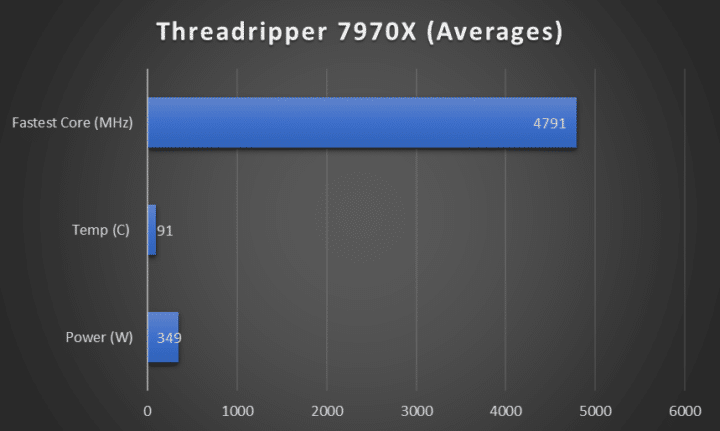
Precision Boost Overdrive isn’t exactly overclocking, but it does relax the thermal and power limits to allow the dynamic boost algorithm to clock higher.
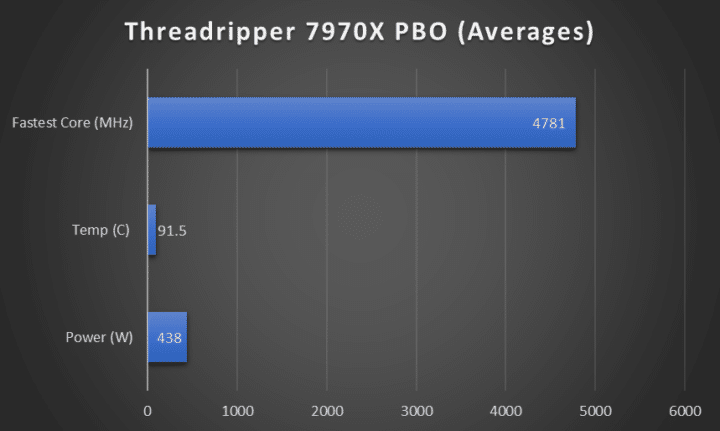
With PBO enabled, the 7970X was up to 1.5% faster in rendering workloads, registering 65K points in the R23 multi-core benchmark. The average power consumption increased to 438W while the core temperatures hovered over 91C. As expected, the fastest cores didn’t see an increase in operational clocks. Instead, they were slightly slower than stock. This is because PBO allows more cores to boost to higher clocks rather than pushing the favored cores to higher limits.
Conclusion
Just like it’s companion 7980X, the Ryzen Threadripper 7970X is a whopper of a chip. It delivers incredible multi-threaded performance, at higher clock speeds than the 7980X albeit with half as many cores, eating content creation workloads for breakfast. Courtesy of firmware optimizations, it also sustains higher core clocks in lightly threaded workloads for superior gaming and media capabilities. Lastly, it maintains a very reasonable power limit of 349W at stock that can be overridden for a mild boost using PBO. However, this is best avoided unless you have a top-end water cooling solution.
AMD Ryzen Threadripper 7970X Review
0
Content Creation Unleashed
Just like it's companion 7980X, the Ryzen Threadripper 7970X is a whopper of a chip. It delivers incredible multi-threaded performance, at higher clock speeds than the 7980X albeit with half as many cores, eating content creation workloads for breakfast. Courtesy of firmware optimizations, it also sustains higher core clocks in lightly threaded workloads for superior gaming and media capabilities.
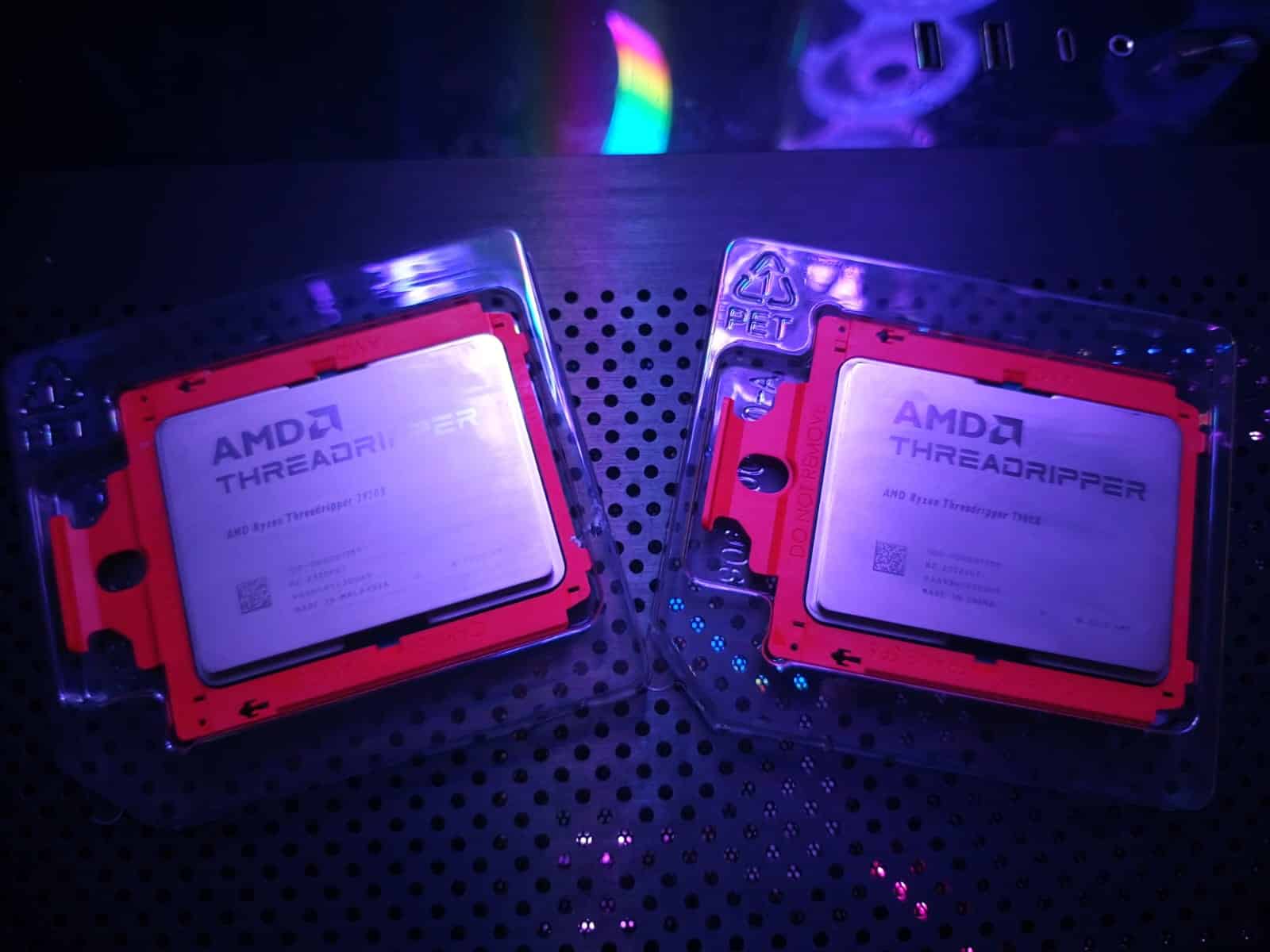
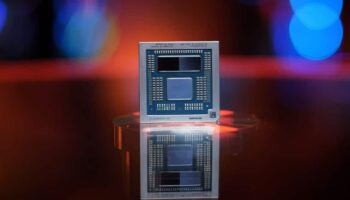 AMD Zen 5 Strix Halo Specs: Console-Level GPU with 2560 Cores, 32MB MALL & 16 Channel LPDDR5 Memory
AMD Zen 5 Strix Halo Specs: Console-Level GPU with 2560 Cores, 32MB MALL & 16 Channel LPDDR5 Memory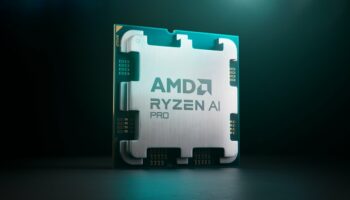 AMD Zen 5 CPUs Allegedly Going to Offer Only 10% IPC Uplift, Claims Lenovo Manager
AMD Zen 5 CPUs Allegedly Going to Offer Only 10% IPC Uplift, Claims Lenovo Manager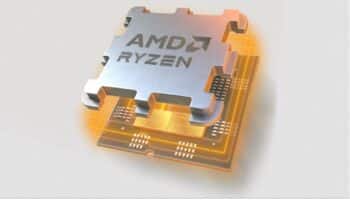 AMD’s Ryzen Desktop CPU Market Share Grows by 21% in Q1 2024; Mobile/Server Flat
AMD’s Ryzen Desktop CPU Market Share Grows by 21% in Q1 2024; Mobile/Server Flat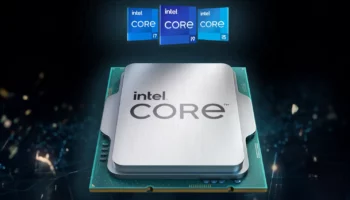 Intel on Crashing CPUs: Baseline Settings Not Suggested for Core i9-13900K/14900K
Intel on Crashing CPUs: Baseline Settings Not Suggested for Core i9-13900K/14900K